I’ve been pondering this for some time; and have tried to somewhat lay out the subject as best as I can here in this article.
This is something of a thought-experiment; trying to track the various strands of consequences from a single event, but moreover, trying to understand why that event has everything to do with where we are now – and on multiple levels – in this first decade-and-a-half of the twenty-first century.
With all the bad things and negative situations going on in the world today, why have things come to this? How could most of this stuff – in the Middle East, in Europe, even in the US – have been avoided?
Could it have been avoided?
As covered in the previous post, the brewing tensions between Kurdish and Shia Iraqi forces raises fears of more, endless conflict in both Iraq and the Middle East – a region that has become, in the twenty-first century, a permanent geopolitical chessboard and violent arena.
But that is merely the latest of a long line of consequences that have come from the event in question – a line of consequences that is explored in the rest of this article, and includes everything from the refugee crisis and the destabilisation of Europe to the devaluation of international law.
More than anything else, this strategy of endless chaos came from the toppling of Saddam Hussein’s Ba’athist regime in the great historic city of Baghdad.
Something I always remembered from the coverage of the Iraq invasion in 2003 was a warning issued by one of the Iraqi regime officials. He had talked about “the gates of Hell” being opened if the US coalition illegally invaded the Arab nation. That language has always stuck with me – of course, the Iraqi official was just talking about his own regime; but, with hindsight, his warning seems apt in regard to a lot more.
(As a side-note, I know that some theorists see the “gates of Hell” statement being related to the alleged Iraqi/Babylonian ‘Stargate’ that the Americans were – according to some – in Iraq to take control of. But I’m not going anywhere near that subject here).

For anyone who’s never seen it, Saddam Hussein’s interview on the eve of the invasion is worth rewatching: listen to what he’s saying here in 2003 and then think about everything that’s happened to Iraq in the fifteen years since then.
By the way, this article isn’t trying to make any case that Saddam or his horrible sons were great guys or that the regime was wonderful.
But I’ve repeatedly come back to this question over the last several years: what if the US-led coalition had never invaded Iraq?
When I was a kid, Marvel Comics used to have this great little series called ‘What If’. Every month, the comic would pose a ‘What If’ question, imagining that some key fictional event in Marvel comics had not happened or had happened differently – and then presenting a story of how that different timeline would’ve played out. It was generally a fascianting premise.
It has also become a well known sci-fi trope – the idea of going back in time and changing some single, important event or moment that seems to have dictated the course of subsequent history. This motif is common in sci-fi – the notion of the single, key point on the timeline. Go back too far and your intervention won’t have the right sets of impacts, and go back not far enough and the results won’t be right.
The idea is generally that you have to back to the crucial point where your intervention can have the most impact in undoing or preventing as much of the negative history that has unfolded.
I’ve wondered about this for a long time in regard to the current world situation.
We have increasingly toxic and divided societies, with cultural or societal harmony beginning to fracture. Mistrust, racial tension, cultural disharmony, regressive attitudes, common anger and suspicion. Very toxic politics. Massive mistrust in government. We’ve had a terrible refugee crisis that has caused thousands and thousands of deaths, as well as had a highly destabilising effect on European socities and politics, all of it a consequence of the destabilisation of the Middle East. We’ve had endless strife, conflict and bloodshed in the Middle East and horrible catastrophes in Syria, Libya and elsewhere.
There can’t be anyone who thinks we’ve come to a good place.
What’s extraordinary is to rewind your mind back to the dawn of this century – and to think how different the outlook was.
If the dawning of a new millennium had seemed like a hopeful, optimistic period – ideas of a new century and a seemingly progressive, progressing society – it is remarkable to look at ourselves now, only seventeen years in, and to see the state we’re in.
What the fuck happened?
Some would argue that when you’re dealing with such complex, multi-faceted problems and developments, you can’t pinpoint the causes to any single event or moment – the issues are so multitudinous that this is impossible. Rather, it’s a matter of endless, diverse webs of cause-and-effect, history and accumulated consequences.
That’s true, for the most part. And as a general principle.
As far as this subject goes, however – literally the problem of where we are right now – I disagree. I think you can pinpoint back to a specific event or moment.
So, getting back to the sci-fi trope or the ‘What If’ scenario, let’s imagine that we are the prospective time-traveller looking at the timeline and trying to figure out where we need to go and what we need to change. You don’t want to go to multiple points in time and make multiple changes, as it would get too messy and confusing.
Is there some point in the timeline we could go, where we could – in one intervention – undo a great percentage of the bad things, the negative events and consequences, and set our timeline back onto a more positive footing?
When indulging in this thought experiment, the answer is always the same to me – we, the prospective time-traveller, would have to go back and stop the invasion of Iraq.

Stop that one thing – the illegal invasion of Iraq – and you potentially create a vastly different timeline to the one we’ve inherited.
That event seems to be the causal nexus from which everything else begins to go wrong: it’s the point, the event, in the timeline that created – arguably – a divergent timeline of negativity, death, war and toxic fall-out.
In other words, I argue that before March 20th 2003, world events could’ve gone an entirely different way.
We can literally go back and look at that illegal invasion and ponder an alternate timeline in which that event never happened.
What would be different now?
It’s extraordinary, in fact; because it starts out with obvious, simple things, but quickly expands into other areas.
The obvious one first: all the people who died in the initial Iraq War would still be alive. That includes all the Iraqis and also all the American, British and coalition personnel.
As of 2013, it was estimated that some half a million Iraqis had died as a result of the US-led invasion.
As of 2016, US personnel deaths were listed at 4,424, with 31,952 non-lethal casualties. British and other non-US personnel deaths were significantly lower, but only focusing on the fatalities paints a false picture of the genuine scale of suffering or loss.
And the death-toll should be expanded to beyond just those who lost life or limb in the actual conflict – but also those who’ve either died or suffered major health or mental-health problems afterward. Again, that includes Iraqis, as well as the casualties from the invading countries’ forces. If the death count is as high as stated above, then we can assume the numbers of those suffering debilitation, health problems or physical or emotional trauma is significantly higher.
And this is just talking about the Iraq War – it isn’t even factoring in what unfolded after the official war was declared over.
To just get some perspective on that, here’s an interesting snapshot. By even just 2005, more than 6,000 soldiers serving in Iraq had already committed suicide. By 2012, more Iraq War soldiers had committed suicide than had even died in combat, making it the year with the highest suicide rate since 2001. I don’t know the figures up to 2017, but one would assume the trend has kept going.
We also know about a very large number of former soldiers who served in Iraq going on to commit violent crimes, even shooting sprees, at home. I don’t know the stats for this, but the victims of these crimes, as well as the perpetrators themselves, should be factored in as casualties of the Iraq War.
It would also be far beyond my abilities to be able to calculate or estimate the number of families, marriages or relationships than have been torn apart due to PTSD, the number of former Iraq soldiers now in jail, the number now possibly living homeless, etc. Where I live, in this part of London, we knew of one Iraq vet who lived homeless on the streets, often verbally abusing passers-by and talking about Iraq. He was around for about two years, then I stopped seeing him. I don’t know what happened to him after that.
Of course, the biggest victims – by far – are Iraqis themselves.
Their suffering – and their humilation as a nation – is ongoing to this day; from Sunni civilians being persecuted or tortured by Shia militias, to mass graves of Shia men after ‘ISIS’ jihadists executed them, to Yazidi women being mass-sold into sex slavery by depraved young men who poured into Iraq from all over the world to feast on the carcass of a nation that the US-led invasion left behind.

On the subject of death-toll, I’m going to come back to that later – because it might be more accurate to calculate a death-toll beyond just the Iraq War, but to include the deaths from other events that have come in part FROM the Iraq War.
Which is why things get more interesting. Because preventing the Iraq War doesn’t just mean preventing the Iraq War – it means also preventing everything that spun off from it.
With no invasion, there wouldn’t have been the rapid sectarian breakdown of Iraq.
Shia militias wouldn’t have gone on the rampage against Sunni communities. Therefore, there wouldn’t have been any Sunni backlash either. And there wouldn’t have been an Islamic State – and there would’ve been no Shia militias. The violence would never have spiralled.
The ISIS caliphate would never have existed.
Hundreds of thousands of people wouldn’t have been made to live under its barbaric, medieval regime.
Massive ethnic displacement wouldn’t have been going on.

Great landmarks or repositories of Iraqi culture and history wouldn’t have been looted or destroyed.
There would be a lot fewer Iraqi refugees.
So, again, going beyond the Iraq War itself – we can add in to the ‘death-toll’ all the people who were murdered, displaced, enslaved or tortured by ‘ISIS’. I’ve never seen a solid figure for that: but I’m imagining it goes into a few hundred thousand.
But again, actually, we should also factor in all the people – all the Sunni civilians – who were murdered by Shia militias after the Iraq War, and whose treatment in fact played a key part in causing the rise of ‘ISIS’ in the first place.
I haven’t seen a reliable figure for those vitims either, but the number would be high – we know that hundreds of dead bodies of Sunni civilians were being reported on a weekly basis at one point.
The civilian death-toll has never let up.
In fact, even this July, some 40,000 civilians were believed to have been killed during the Iraqi (Shia) forces and US operation to retake Mosul from the Islamic State group.
That’s just from one operation – think of how high the overall figures would have to be when you add up all of the years of violence from the Shia militias, the Islamic State terror group, the Iraq War insurgencies and terror attacks, and all of the collateral damage from US and coalition strikes not just in the war, but since anti-ISIS operations began a few years ago.

Further, no IS Caliphate means there would have been no base from which the organisation could spread its tentacles around the world.
In fact, arguably, the subsequent war in neighbouring Syria might’ve never happened.
At the very least, it wouldn’t have spiralled as much as it did and as quickly as it did, because the Syrian government wouldn’t have to deal with the jihadism from neighbouring Iraq or the general instability of its neighbour. Much of the violence in Syria was spillover from the violence in Iraq – and, in fact, the ‘Islamic State’ (despite Western propaganda to the contrary) didn’t grow out of the Syria conflict, but came from the Iraqi sectarian conflict following the US-led invasion.
There could therefore be an argument to include the death-toll from the Syria War as a direct consequence of the Iraq invasion.
Which would add something like another half-a-million deaths to the toll – not to mention all of the material destruction of Syrian towns and cities, Syrian heritage, and the displacement and carving up of Syrian communities.
In fact, the catastrophe in Libya might not have happened either. It was well known that many of the ‘fighters’ in Libya – the so-called moderate rebels – were jihadists who’d come over from the Iraqi fighting; extremists who’d developed their skill, experience and bloodlust in the instability and sectarian strife of post-invasion Iraq and who now saw the chance to create the same in Libya.
Moreover, the very act of the US, Britain and its coalition invading Iraq and overthrowing the regime helped to create the environment or precedent via which they could then go and do the same thing in Libya – something that was openly foreseen by Gaddafi himself, who had warned other Arab leaders in a 2008 summit that the Arab nations should not have stood by and done nothing when Iraq was being invaded.
“Any one of us could be next” he had warned – and he was proven right.
If there had been no failed ‘revolution’ in Libya, no spiralling war in Syria, and no invasion of Iraq, the Refugee Crisis wouldn’t have happened.
There wouldn’t have been the exodus of Syrian refugees, Iraqi refugees, or migrants pouring through Libya. Arguably there might still have been some number of migrants fleeing Sub-Saharan Africa, but the overall crisis would’ve been much, much smaller in scale than what Europe has been experiecning since 2015.

It’s the destabilisation of Syria and Libya that has created the scale of the movement. Moreover, had Gaddafi’s regime in Libya not fallen, there wouldn’t be any people-smuggling operation going on and there would be no criminal networks sending unsafe migrant boats from the Libyan coast to Italy.
Not only would there not have been a criminal operation going on, but the fact is that most of the Sub-Saharan migrants or asylum seekers wouldn’t have been seeking to cross to Europe anyway – because, as previously pointed out, Libya used to be their end destination. Prosperous, developed and well-functioning Libya used to be where the migrants were seeking to end up, where they could be absorbed into the work force, particularly in construction.
When Libya was destroyed in 2011, all of this was over – the migrants were still coming, but instead of finding work or opportunities, they were prey for the criminal gangs and networks that were now thriving in the lawless, post-Gaddafi state, and who began extorting money from migrants to launch them on unsafe boats into the Mediterranean.
Even if we just talk about Iraqi refugees alone, we’re talking about some 4.4 million internally displaced (according to UNCHR figures from 2015) and over a quarter of a million fleeing abroad.
Those figures will be much higher now, given the events in Mosul and elsewhere.
There were in fact large numbers of Iraqi refugees pouring into Syria after the Iraq War. And as a knock-on effect of, first the Iraqi refugee crisis, then the Syrian crisis, the refugee population has swelled massively in Lebanon, Jordan and Turkey.
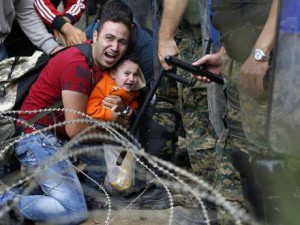
Now, I realise I argued in the Libya book that the killing of Gaddafi and toppling of the Libyan state was what allowed the war in Syria to spiral and the refugee crisis to unfold: and this is true.
But if we, the prospective time-traveller, were to go back to Libya in 2011 and try to prevent that crisis from happening, it wouldn’t be enough. Because the problems caused by the toppling of Saddam Hussein’s regime would still be unfolding, even if Gaddafi was still alive.
Let’s just recap where we are so far. No Iraq war. Therefore – probably – no intervention in Libya and no war in Syria. Therefore no refugee crisis.
Also, of course, with no ‘ISIS’, there wouldn’t have been this dramatic increase in terrorism in Europe.
So most of the high-profile terror attacks would never have happened (this is, just for the sake of this article, assuming that they were ‘real’ terror attacks in the first place and not purely state-organised false-flags).
With no terror threat and no refugee crisis, Western politics would look very different too. There would probably be no perceived rise of the Far-Right or reversion to nationalism or modern ‘Populism’ – because the things that are used to fuel those movements or ideologies wouldn’t have been there.

Without the refugee crisis, for example, the AFD in Germany wouldn’t have a leg to stand on. The Far-Right wouldn’t have any kind of support in Austria, Denmark, the Netherlands or any other countries whose natural leanings would’ve firmly remained liberal and tolerant.
It is therefore questionable whether we would’ve ever come to a Trump presidency – though, admittedly, this one’s debatable. But certainly, in terms of Europe, we wouldn’t have such a perceived shift to nationalist or hard-right movements.
What’s obvious is that this current terror wave in Europe wouldn’t have been happening had vast parts of Iraq, Libya and Syria not collapsed into lawwless, terrorist havens. And it wouldn’t have happened in Libya or Syria had it not first happened in Iraq.
Even going all the way back to 7/7 – this attack seemingly had everything to do with the illegal invasion of Iraq. This was the motive offered by the alleged 7/7 ringleader. Now, admittedly, I don’t believe 7/7 was a real terrorist attack – I fully believe it was a state-organised false-flag (see here). But, even on that premise, there’s a strong case that the main motive for that false-flag was to give the British government a justification for remaining in Iraq at a time when pressure on Blair was mounting to pull British forces out.
Coming back to death-toll numbers – we might want to add in the deaths then from all the terror attacks that can be linked either to Iraq or to ‘ISIS’. This would include 7/7, but would also encompass a number of other, more recent attacks.
There’s more though.
The decision of the US, UK and the “coalition of the willing” to defy the UN, breach international law, and invade Iraq could, arguably, be seen as the point at which the principles of international law went out of the window and the point at which the United Nations became meaningless.
We now live in a geo-political climate where multiple nations violate what used to be thought of as international law and involve themselves – covertly or overtly – in what used to be considered the sovereign affairs of independent countries.
The list is long: take Turkey’s violations of Syria, Iran’s involvement in both Syria and Iraq, Saudi and Iranian involvement in Yemen, Israeli involvement in the Kurdish situation, etc. As well as the bombings and drone strikes that the US and other nations now carry out in all sorts of countries – in breach of what used to be international law.
To what extent did the illegal invasion of Iraq set the precedent by which all of this flagrant violation of sovereignty could be conducted thereafter?
And if the US and Britain – two democratic, freedom-loving countries considering themselves powers for good – could violate international law and carry out an illegal invasion, why would other powers not decide to start doing the same thing?
Meanwhile, trust in government in general is at an all-time low.
While trust in government has always been a shaky thing, it could be argued that the sheer extent to which governments are mistrusted now can be traced back in large part to the illegal invasion of Iraq. In the UK, millions of people marched in protest against the government joining the US-led invasion. It was illegal. The arguments to justify it were widely seen as unconvincing. And the UN refused to legitmise it.
The fact that it went ahead anyway – with all the problems and consequences that followed, along with a continous stream of evidences that the case for invading had been built on lies – served to shatter a great deal of general public confidence in the government.
I’m not sure politics – both domestic and international – has recovered from the Iraq War.

Tony Blair has been made the chief scapegoat for the whole thing; but, in fact, Blair’s deceptions weren’t the decisive factor. It is entirely clear that, even without Blair or Britain, the US would’ve invaded anyway – they were already going through with the invasion, with or without the UK. It’s just that Blair helped legitimise it more and helped produce some of the false ‘evidence’.
The rapid growth of radical Islam also traces back significantly to the Iraq War.
Not that extremist ideaologies and organisations didn’t already exist; but the Iraq War provided not only the playground for extremist actors and jihadists to flourish, but also the recruiting power to convince scores of young men of the “evil” of America and the West.
How many people have been swayed by extremist propaganda because of the Iraq War?
There were in fact warning at the time that invading Iraq was going to create a generation of radicals and extremists – those warnings were ignored.
The Iraq War has massively served the radicalisation agenda and played the central role in fueling the ‘clash of civilisations’ paradigm. This was the case both in the UK and Europe and also in the Middle East and the Muslim world itself.
In much of the Middle East, for example, the images of torture and humiliation at Abu Ghraib were widely circulated and were presented as evidence of what the US and the West was doing in this country they had illegally invaded.
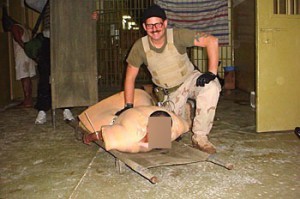
You simply cannot overestimate the extent to which Abu Ghraib was used to radicalise people and stoke anti-US, anti-Western feeling.
Arguably too, the radicalisation problem on the Muslim side has unfolded hand-in-hand with the growth of Islamophobia and rebirth of Far-Right ethno-nationalist attitudes in a number of Western societies: and the growth of the former has fueled the rise of the latter.
With no Iraq War, it is questionable whether this would’ve happened.
We could probably go on further and further, looking more and more, at what has unfolded from Iraq onward. But it probably isn’t necessary.
So, I’m imagining a timeline in which Iraq was never invaded.
And I’m seeing an ongoing, stable Iraq under a secular national government. Millions of people who died are instead still alive.
There is no refugee crisis and no destabilisation effect on Europe.
Therefore white nationalism is still very much a fringe joke that no one take seriously.
The ‘Islamic State’ has never existed.
There is therefore no real terror threat or terror incidents in Europe or the West. Islamist radicalisation probably still exists to some degree, but it is a very small problem and not something that infringes very much on society.
The war in Syria never really gets going. Libya is probably still a stable, fast- developing country, still in the Gaddafi era.

With the Ba’athist regime prevailing in Iraq and Syria, Iran has no control in either Iraq or Syria – therefore the Saudis aren’t as concerned about expanding Iranian influence; and therefore the proxy war between the two powers arguably never really escalates. In that scenario, the Saudis don’t bother involving themselves in Syria, because they don’t perceive an Iranian threat.
Arguably, no proxy war unfolds in Yemen either between Saudi and Iranian interests.
Iran is Iran. Iraq is Iraq. Syria is Syria. There are no militias or proxy armies or weapons crossing borders. Sovereignty is still a thing – and all countries are stable, tending to their own affairs as independent, sovereign Middle-Eastern states.
And this doesn’t just preserve the stability of the Middle East; it also ensures the stability of Europe.
Of course, I’m aware that the flaw in this article is that it almost assumes the Iraq War was a ‘mistake’ or misjudgement that should’ve been avoided – when, in fact, we know it was a pre-planned operation going back years and servicing a broad agenda.
This is evident alone in the extent to which the Bush regime tried to fabricate non-existent links between Saddam’s regime and 9/11 or Al-Qaeda, as well as the fact the breaking up of Iraq and the Middle East into ethno-states was already being envisioned in US and Israeli foreign policy think-tanks long before Saddam’s regime was attacked.
Nevertheless, the point stands: Iraq was the point at which everything diverged from any semblance of sanity and started to go very wrong.
It was the point at which the negative domino effect started, first in Iraq, then the Middle East, then Europe and the West: it was the nightmare from which multiple other nightmares unfolded.
The death-toll is enormous – and grows bigger the more you expand the equation out to the knock-on effects in other countries.
The scale of suffering – be it emotional, psychological, medical, or societal – is enormous, spanning multiple countries. The level of cultural breakdown and ethnic displacement has been Biblical in proportion, again spanning multiple countries and societies.
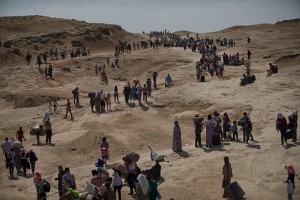
The effect on the geography, as well as the cultural make-up, of the Middle East is ongoing. The effect on radicalisation, on religious, ethnic or social polarisation, is incalculable.
The stain it has left on American, British and Western powers is enormous and will last for generations.
The effect on subsequent geopolitics and international relations has been catastrophic and is ongoing; as well as the effect it has had on international law.
The entire Iraq War was a total, absolute failure. Nothing good was accomplished or came from it.
And it was entirely avoidable, entirely unnecessary, and built on deceptions. It was massively opposed and protested. It was illegal under international law. And yet the Neo-Con administration in the US went to extraordinary lengths to make it happen; fabricating false links between Iraq and 9/11, launching a propaganda programme to justify the invasion, and enlisting Tony Blair and the UK to help legitimise the war and win broader support.
It’s the extent of manipulation that was resorted to in order to go ahead with the invasion – and with all of its vast consequences – that is most extraordinary.
The Nuremberg Tribunal convicted and sentenced Nazi leaders for wars of aggression (wars not launched in self-defense). The Tribunal considered wars of aggression to be the ultimate war crime, which encompassed all the other crimes associated with war. To initiate a war of aggression, therefore, was – according to Nuremberg – not only an international crime; it is the supreme international crime, differing only from other war crimes in that it contains within itself the accumulated evil of the whole.

Even before factoring in any of the consequences or post-war problems – even if we focus solely on the Iraq invasion itself – it was a War Crime.
And it was also, as I have argued through this article, the key point on the post-Millenium timeline that set in motion all of the terrible things to come.
Of course, I’m aware that much of this is speculative; and also that you couldn’t be 100 percent sure that stopping the Iraq invasion would prevent necessarily *all* of the other things that came after. But it would definitely significantly alter the timeline in multiple ways that could all be regarded as positive: and would certainly undo many of the negatives, including some of the very big ones.
I’m seeing an alternate timeline in which the invasion never happened – and it mostly looks a lot better than the one we’ve got.
Read more: ‘The Refugee Crisis – Exposing the Lies & Propaganda’, ‘The War Legacy: The Suffering & Humiliation of the People of Iraq‘, ‘Destroying the Cultural/Historic Heritage of Iraq & Syria‘, ‘The Libya Conspiracy – A Guide to the Lies of the Libya Intervention & the Crime of the Century‘, ‘The Truth About Torture & the Post 9/11 Quagmire‘, ‘The Global State of Human Rights – And Why the Paradigm Needs to Change‘…


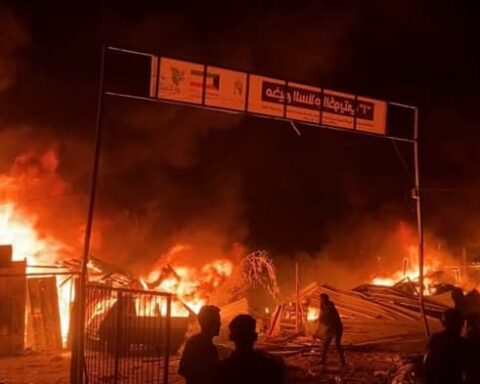
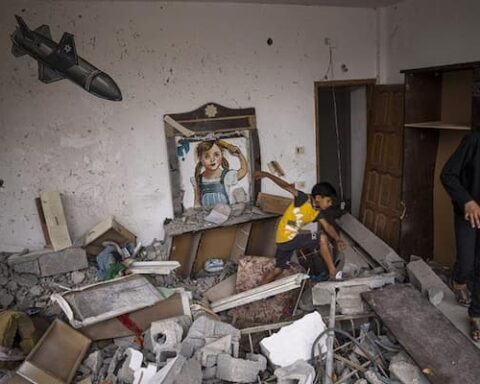

Cause and effect … terrifyingly brilliant
You should also include the millions of iraqi civilians murdered, including over half a million babies, as part of the globalist power-mongerers’ deliberate and pre-meditated plan to decimate a whole nation, prior to having to resort to the final option of a ground invasion. Thomas Nagy’s eye-opening document here uncovers just one aspect of this deliberate genocide of an entire nation:
https://www.google.co.uk/url?sa=t&source=web&rct=j&url=http://www.casi.org.uk/info/nagy010612.pdf&ved=0ahUKEwidjYq604rXAhXEExoKHcBiDeoQFggoMAE&usg=AOvVaw2sqZ_YiDNYTLYOkZ5Q3Tws
Too true. And all very sad. Thanks for this very thoughtful overview.
The years before the Millennium were indeed halcyon but perhaps only because we were caught sleepwalking after the apparent end of the Cold War. Somehow the West’s bombing of former Yugoslavia and the first Gulf War hadn’t been enough to awaken many of us (I was as politically disengaged as anyone back in 2000).
Then came 9/11 and the instant aerial bombardment of already war-torn Afghanistan and the pre-prepared roll out of those orange jumpsuits and cages in Guantanamo. All of this was deeply sickening.
Later, I marched against the Iraq war because along with two million others (plus tens of millions at home – 80% of the population according to one poll) I knew damn well that the WMDs were pure fiction. And we genuinely believed we might stop the carnage – failing only because it was impossible to move the sheep in parliament. Today they bleat about how they were fooled. Nonsense – how could they fail to see the blindingly obvious too…?
Well, of course they did know and that’s the shocking truth that undid my own cozy feelings about British democracy. For evidently the Blair govt and Tory opposition didn’t dare “damage the special relationship” – indeed, remember how the media went for Miliband after he stymied Obama’s and Cameron’s planned attack on Syria. For days on end the hacks harped on about how untold and irretrievable damage had been done to “the special relationship”. Pure b/s of course. But Miliband most likely did hold back the attack on Syria and spared the world from an ISIS victory. (It was his finest hour by miles.)
As you say, regime change in Iraq was doubtless a fait accompli, but Britain’s involvement still helped to disguise America’s naked aggression that would otherwise have been completely exposed. And though a vote in parliament against the war may not have stopped all of the bloodshed in Iraq, it might very likely have saved Libya and Syria.
Laying much of the blame on Bush and Blair is justifiable though we should strive to put *all* of the war criminals on trial. Blair’s inner circle and the neo-cons in Washington. (It may happen yet.) And then America needs to retrace another step along the way to pandemonium it has unleashed by reopening a full inquiry into the attacks of 9/11. That was when the rot really set in. After that the rest of the dominoes were set up to tumble… and according to Wesley Clark’s hit list, it is Iran that comes next.
Yes, Miliband’s finest hour was probably that. And I also remember the flack he took from also the Israelis for both this and also opposing the bombardment of Gaza in 2014 – as if he was somehow betraying his Jewish roots or something.
I generally rate Ed Miliband fairly highly.
On another note, I’m not excusing Blair for his role – just saying, as you acknowledge, that the invasion was going to go ahead anyway.
But you raise a very good point: what would’ve happened if the invasion had gone ahead, but Britain had stayed out of it?
Excellent article BBB … I have often pondered these questions.
My thoughts are … would the US have been able to carry out this crime if the USSR had still been strong? Events today with Russia’s involvement in Syria indicate otherwise.
I wonder where we would be today if the USSR had moved away from communism in a more orderly manner …
Thanks for your great work …
Thank you, Helen. You raise a really good point. Actually, I remember thinking that the Russians were almost having to bite down really hard to keep themselves from intervening to stop the NATO assault on Libya. It was clear from Putin’s comments athe time – and from Russian media coverage – that they might’ve even contemplated coming on on the side of Gaddafi’s govenrment. Instead, they decided to stand back and see how things played out.
When it got to Syria – aside from Russian interests being in jeapordy – I think they also decided enough was enough.